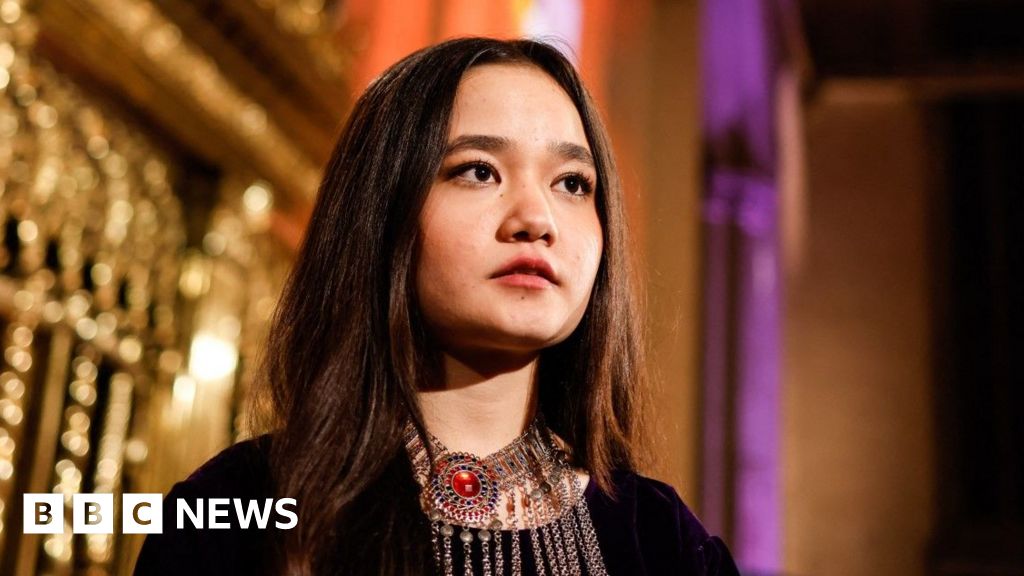When Nila Ibrahimi set out to build a website telling the stories of Afghan girls, it wasn’t just to give them a voice.
The 17-year-old Afghan refugee was also determined to remind her fellow Gen Zs in her adopted country, Canada, that they were similar – they even listened to Taylor Swift just like other teenage girls around the world.
“I want to make them as real as possible so that other people, especially young people, Gen Z specifically, can put themselves in their shoes,” she told the BBC.
Nila spoke to the BBC earlier this week, before picking up the International Children’s Peace Prize previously won by education campaigner Malala Yousafzai and climate activist Greta Thunberg.
Nila’s is, perhaps, not an easy task. The plight of Afghanistan’s women and girls can feel a world away to young people living in Canada, where Nila found a home after fleeing her home country as the Taliban took over three years ago.
In that time, the Taliban have banned teenage girls from education, banned women from travelling long distances without a male chaperone, and now ordered them to keep their voices down in public – effectively silencing half the population.
The Taliban have defended the rulings to the BBC previously by saying they align with religious texts.
“The differences [between Afghanistan and Canada] are vast, so it makes it hard for them to feel connected,” acknowledges Nila.
That is why she helped set up HerStory – a place where she and others help share the stories of Afghan women and girls in their own words, both inside and out of the country.
“So many times we are lost in the differences that we don’t see the similarities and that’s our goal, to show that to the world.”
Nila Ibrahim was chosen from 165 nominees as the 20th winner of the prestigious prize.
The award recognises not just the work done on HerStory, but also her passion for standing up for women’s rights in Afghanistan.
Nila’s first stand for women’s rights came in March 2021, when she joined other young Afghan girls in sharing a video of her singing online.
It was a small but powerful protest against a decree by the then-director of education in the Afghan capital, Kabul, who tried to ban girls over 12 singing in public. The attempted order was never implemented.
“That was when I really understood the importance of performing, the importance of speaking up and talking about these issues,” explains Nila, who was part of a group called Sound of Afghanistan.
But less than six months later, everything would change – and, aged 14, she would have to flee with her family as the Taliban arrived.
The family – who are part of Afghanistan’s Hazara minority – made the difficult journey to Pakistan, where they spent a year before being granted asylum in Canada.
It was, after 12 months without education, a “breath of fresh air”, she says.
There, Nila was reunited with her friends from the singing group.
She was also invited to speak at events, about her experiences of Afghanistan, allowing her to advocate for all the girls left behind.
People, she says, were surprised at how eloquent she was. But Nila knew there were millions of women and girls in Afghanistan who were just as capable – although with less access to the opportunities she had.
“So I thought if my potential can surprise these people and they don’t know about how educated girls from Afghanistan can be, what if that information was accessible to them?”
HerStory – the website which grew out of this thought – started in 2023. It features interviews and first person accounts from both refugees and women inside Afghanistan.
The idea is to create a safe space where a group of people who “grew up with the stories of the first period of Taliban and how horrible the lives of women were at the time” share their stories – and their “shock and anger” at finding themselves in an increasingly similar situation.
The anger is a feeling Nila tries to keep separate from her work.
“When you see Afghanistan going back in time in 20 years, of course it makes you fear,” she says.
“It’s a shared feeling. It’s a shared experience for girls anywhere.”
The award, she says, is a chance for Afghan girls to once again remind the world about the restrictions they face on a daily basis – a reminder “not to forget Afghan girls”.
Marc Dullaert, founder of the KidsRights Foundation, which runs the award, pointed out that a “staggering” number of young women were currently being excluded from education.
“Nila’s inspirational work to provide them with a voice that will be heard across the world makes her a truly worthy winner of this year’s 20th International Peace Prize,” he added.
It is also a reminder that her generation – while young – can make a difference, Nila hopes.
“I think so many times when we talk about issues and different causes, we talk about it with the very adult like approach of oh, this is very serious,” she says.
“The world is a very scary place, but there is an approach that is more Gen Z-like… and we can take little steps and… do whatever we can.”

